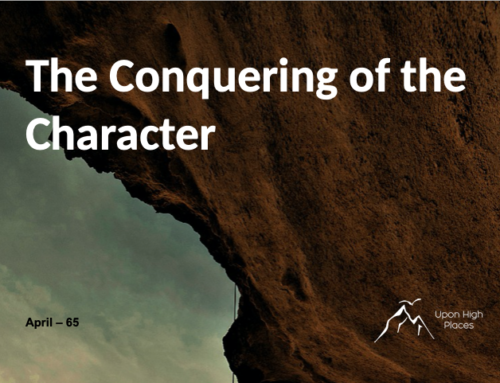God willing
November 2022
My dear youth:
Very often we hear people say: “I’ll go there tomorrow,” “see you on Sunday,” “I graduate on Friday,” and similar phrases where the human desire to do something concrete is seen. There is nothing wrong with it; the problem is that God is excluded from the project. God is sovereign, the times belong to Him and nothing happens without His allowing or provoking it, even the smallest things. That is why James clarifies this matter when he says: “Come now, you who say, ‘Today or tomorrow we will go to such and such a city, spend a year there, buy and sell, and make a profit”; whereas you do not know what will happen tomorrow. For what is your life? It is even a vapor that appears for a little time and then vanishes away. Instead you ought to say, ‘If the Lord wills, we shall live and do this or that.’ But now you boast in your arrogance. All such boasting is evil.” James 4:13-16.
Forcing God
This same issue governs many of the prayers that are raised to God. It is requested for such and such a thing, but without leaving room for the sovereign and wise will of the Lord. James himself says in the same context as the previous verse: “You ask and do not receive, because you ask amiss…” James 4:3. Although he is talking about those who ask to spend on their delights, it also applies to any prayer that does not contemplate the sovereign will of God. Like, for example, when we ask God to heal this or that person or ourselves. It’s like forcing healing without understanding that He knows everything that surrounds us or internalize in our mind, all future and past circumstances, what actually suits us and not what we want. Accepting what suits us instead of what we want is a tremendous challenge for every believer, so we are naturally formed to desire or yearn for what we believe is best for us, without having a deep knowledge of all the variants, situations, or circumstances that may occur during the process and that only God knows.
In other simpler words, we ask or think according to our limited vision. An example is when Samuel went to Jesse’s house to anoint the future king of Israel and stood before Eliab, he said: “… Surely the Lord’s anointed is before Him!” 1 Samuel 16:6. If it had been up to Samuel, Eliab would have been anointed, but without God’s consent. This can happen in our days. We do or think and decide things according to our limited human vision. But… what does God really think? What is His will?
Luckily Samuel was a man of prayer and faith, so he was able to receive evidence that the idea that Eliab was the right man was wrong. And God was guiding him until David arrived, the one who had been chosen by heaven as the future king. A thought, dear young man: what would have happened if Samuel had not been a man of prayer and close communion with God? We can already imagine it.
Seek the divine will
Following this line of thought we can introduce another matter that is related to what we talked about. When a young man or woman decides to look for a future spouse to found a home, they are naturally led by human criteria. But something much more powerful and accurate than human sight is available to a believer, and it is the sovereign will of God, which will surely manifest itself when one is willing to place oneself completely in the hands of the Almighty and has an earnest desire of being led by His divine will.
If the person in question asks God to guide him in the choice of his future partner and tells the Lord, that although he likes this or that person, he is not going to choose without His approval, he is submitting his will to the divine; he is letting God enlighten him and manifest His will, which will surely be revealed in one way or another. This is what the Bible and the Testimonies teach: “For in You, O Lord, I hope; You will hear, O Lord my God.” Psalm 38:15. “He shall regard the prayer of the destitute, and shall not despise their prayer.” Psalm 102:17. “And if we know that He hears us, whatever we ask, we know that we have the petitions that we have asked of Him.” 1 John 5:15. There are many more biblical texts that show us that God answers sincere prayers request enlightenment.
“We are living in the last days, when the mania upon the subject of marriage constitutes one of the signs of the near coming of Christ. God is not consulted in these matters. Religion, duty, and principle are sacrificed to carry out the promptings of the unconsecrated heart.” Testimony Treasures, vol. 1, pg. 573. Young Christians have the power to choose their future spouse in two ways: by the impulse of their heart or through seeking God’s rule and approval. Abraham’s servant was commissioned by his master to go find a wife for Isaac. We know the story well. It was through prayer and firm trust in the power of God to know what is best that the servant found the woman that God had prepared for Isaac. He did not choose her based on his experience, personal intelligence, human vision, feelings or emotions, but on the spiritual evidence that God showed him.
When we project something, the Bible teaches us that we must ask or desire according to the divine will, just as James expresses it with the words: “If the Lord wills.” Everything we build without taking God’s will into account is fragile, insecure, and surely disappointing. Jesus, who is our example in everything, when He found himself in the most difficult moments of His life, prayed: “‘Father, if it is Your will, take this cup away from Me; nevertheless not My will, but Yours, be done.’” Luke 22:42. Here is the right reference for every young person in matters of desire. In His humanity, Jesus did not want to go through that terrible ordeal, but He knew what He had to do; He had done it all His life: let God do His will, His holy and divine will, even if it did not coincide with the His own. Only in this way could He win in every conflict with the enemy, and in fact this was already prophesied about the Savior: “I delight to do Your will, O my God, And Your law is within my heart.” Psalm 40:8.
Conclusion
Dear youth, each son and daughter of God has a challenge ahead of us: learning to do God’s will. Be aware that it is only by accepting what God wants in relation to our life and every matter that constitutes it, that we can truly be happy. What God wants is always the best and it is evident that if the decision we make is based on the sovereign will of God, success will be guaranteed. I invite you to make David’s prayer your own: “Teach me to do Your will, for You are my God; Your Spirit is good. Lead me in the land of uprightness.” Psalm 148:10. Amen.
José Vicente Giner
Pastor and leader of the Youth Department
of the General Conference
For personal and group reflection:
- Why is God often overlooked in the affairs of life?
- What does it mean to do God’s will?
- How interested are we in assuming the attitude of letting God’s will be done?







